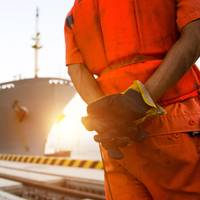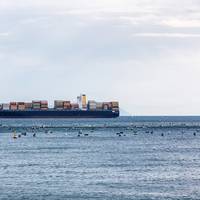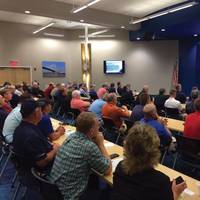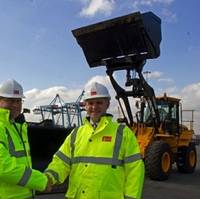Five Tips to Keep Workers Safe in 2024

The maritime industry accounts for more than 90% of global trade and employs over 3 million people in the United States, and like other modes of transportation, our industry encounters unique risks. Waterfront workers are exposed to various hazards such as heavy machinery, hazardous substances, extreme weather and long hours. If not properly managed, these hazards can result in serious injuries, illnesses and even fatalities. That is why ensuring the safety of waterfront workers is a top priority for all of us who work in the maritime industry.
Marine Consultants Lead Safety Training Around Offshore Installations

An Aberdeen-based maritime specialist has launched 500m Zone Management training courses to address concerns raised around offshore installation safety zones. Seacroft Marine Consultants is aiming to raise awareness of the need to control marine operations inside the 500m zone as the HSE highlights worries around the control and monitoring of vessels attending installations. With 97 percent of collisions occurring within the 500m zone involving vessels there on legitimate business…
Human Failure Affecting Shipping Safety Performance

Data from maritime safety specialist Propel shows huge potential to reduce risk of serious accidents. “Human failure tops the agenda of many companies though few know how to address it in a proper way. Collaboration, trust and engagement of all personnel -ship and shore- are vital to reduce major accidents. The whole industry needs to change its focus when it comes to improving maritime safety,” said Benedikte Wentworth, CEO of Propel. According to Propel, despite the continuing downward trend in total vessel losses…
Inside IRClass

Arun Sharma, Chairman & Managing Director, head of IRClass, discusses advances at the classification society as it celebrates 40 years. Indian Register of Shipping (IRClass) is India’s “National” Ship Classification Society, formed to fill the need for having an Indian ship classification society due to the increase in Indian flagged commercial shipping tonnage, post-independence. Accordingly, Sir Ramaswamy Mudaliar first proposed to set up a National Classification Society. In response the Ministry of Shipping & Transport convened a meeting in Delhi on May 29…
SubM Debut Now Set for February 2016

The perennial “Year of Subchapter M” has been kicked forward again, this time to February 2016. That means that the clock is now ticking loudly for those towing operations that have yet to climb onboard the safety train. Quality operators see standardized safety practices as a way of leveling the playing field, integral to maintaining the health and profitability of their fleets, and key to winning business from quality customers. Subchapter M will be a phased-in over a period of years. It’s not as much time as you think.
Pilots Push to Avert Ships of Shame
A leading maritime company has launched a push to prevent hundreds of dangerous, unseaworthy ships from being detained at Australian ports. Australian Reef Pilots (ARP) has started providing ship safety audits at overseas ports to assess whether foreign ships bound for Australia are up to standard. ARP General Manager Alan Maffina said the Australian Maritime Safety Authority (AMSA) aimed to randomly inspect about 80% of vessels calling at Australian ports and would not hesitate to delay any that were not up to scratch. “195 foreign ships were detained in the year to May,” Maffina said. “Most were held for a few days but several were tied up for more than a week and one was kept idle for 47 days while its faults were fixed.
Peel Ports, JCB and Briggs Partner Across Supply Chain

Briggs Equipment is helping Peel Ports Liverpool to maintain the nation's supply of animal feed after securing a multi-million pound contract to supply and service JCB equipment to one of the country's busiest ports. One of Britain's largest port groups, the Peel Ports Group operates five major gateways, handling a broad spectrum of international trade amounting to more than 65 million tons of cargo a year. The Peel Ports facility in Liverpool is home to the country's largest animal feed store and as a result has taken delivery of five new JCB wheel loaders supplied by Briggs.
Profile: Ralph Senner, Karl Senner Inc.

Karl Senner LLC is a ubiquitous figure in the Gulf of Mexico workboat and offshore industry, supplying signature propulsion brands and service for decades. Industry insiders may have noted some changes of late, specifically the slight corporate identity slide from an “Inc.” to an “LLC”, and the ascension of Ralph Senner to the lead position. MR visited with Ralph Senner for insight on the outlook ahead for the company. You have been at the helm at Karl Senner, Inc. since May of 2012. What will remain the same for you and your customers?
Braving the Human Element in Safety
The maritime industry is notorious for braving the elements. One element however — the human one — poses greater safety risk than rough seas or gale-force winds and is requiring more companies to take an aggressive approach in emphasizing every employee’s role in their risk management efforts. While maritime companies have developed technologically sophisticated hull designs, stability systems, propulsion systems, and navigational equipment, overall the industry’s safety record could be better. It is undoubtedly one of the world’s most risky and complex industries. And as such, it requires very attentive focus on safety and risk management issues, especially in light of the economic and workforce issues facing the industry today.
Pipeline Contractor Sentenced for Safety Failure
According to Maritime New Zealand, the lead contractor on Christchurch's ocean outfall pipeline project has been convicted and fined $115,000 plus costs, after admitting a series of safety lapses on the project - two of the breaches occurring the same day as another accident killed two workers. In the Christchurch District Court on Dec. 9, McConnell Dowell Constructors Ltd were sentenced after earlier admitting one charge under Section 68 of the Maritime Transport Act (MTA) 1994 and one charge under sections 50 and 6 of the Health and Safety in Employment Act (HSEA) 1992, resulting in fines of $10,000 and $50,000 respectively. The company was also ordered to pay court costs of $130 on each charge.
Implementing an Effective Personal Protective Equipment Program
Some of the newest OSHA regulations impacting the shipyard industry deal with Personnel Protective Equipment (PPE). When this set of standards was first published, many questioned the need for them - after all, how complicated are hardhats, safety glasses or steel-toe boots? At first glance, a PPE program does not seem very complex or difficult to implement; however, I have found this is a consistently deficient area in the safety audits I have performed. When I visit workplaces, I often find inappropriate PPE is being used or PPE is not being used at all. The identification of the appropriate PPE associated with a particular task or job classification is the first step in an effective PPE program.
DG Shipping Recalls 27 ONGC Supply Vessels
The Directorate General of Shipping (DG, Shipping) has asked India’s biggest oil explorer Oil and Natural Gas Corporation (ONGC) to recall 27 of its 46 supply ships for undergoing safety audits immediately. The DG Shipping directive, which could lead to the disruption in oil production, has come within days after an ONGC-chartered ship, Samudrika-10, sunk off the Mumbai coast, killing five people on board. In a notice dated July 11 to ONGC, the DG Shipping ordered around 27 OSVs (offshore supply vessels) to be recalled to the base for undergoing safety management tests before resuming duty at Bombay High. ONGC operates 46 offshore supply vessels which help in production and maintenance of India’s largest oil field, Bombay High, situated 160 kilometers north west of Mumbai.





